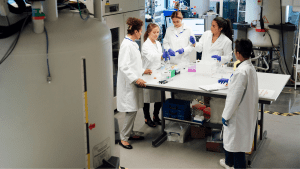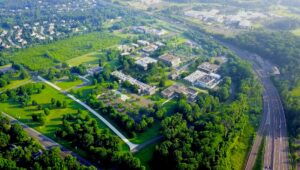
Seven Public Cell Therapy Companies Delivering Opportunities for Investors and Patients
Cell Therapy IPOs Drive Success Across the Philly and Maryland Hubs
Cell therapies have grown to become a prevailing field dominating new medical breakthroughs with the promise of treatments and cures for multiple diseases. The biopharma hubs of Philadelphia and Maryland have emerged as important drivers of this new wave of medicine, build on the foundation of renowned research institutes, universities, and a number of successful cell therapy companies who have paved the way forward in this field.
Successful advances made by these cell therapy-focused companies have drawn the eyes of venture capitalists and other investors who provide significant amounts of capital to advance these cutting-edge modalities. Earlier this year, Allied Market Research predicted the global cell therapy industry will be valued at $48.11 billion by 2027. That’s a significant growth trajectory from an estimated value of 7.75 Billion in 2019. With that kind of expected growth, it is no wonder that investors are closely looking at cell therapy companies exploring a potential move toward becoming a publicly traded company.
Philadelphia, now known as Cellicon Valley because it has become a hub for cell and gene therapies, has established a vibrant ecosystem to support the rapid growth of this field that offers multiple advantages over other regions. Home to industry pioneers in the field, including Dr. Carl June and Dr. Jim Wilson at the University of Pennsylvania, and other leading experts out of Children’s Hospital of Philadelphia, Jefferson Health, and the 30 cell and gene therapy companies, the city is stacked with a renowned pool of leaders in cell and gene therapy.
For years, Maryland has been blazing a trail in cell and gene therapies with advancements coming from companies, government facilities such as the National Institutes of Health’s National Cancer Institute, and academic research institutions, like Johns Hopkins University and University of Maryland. It’s that atmosphere that compelled TCR2 to select Rockville, Maryland for its commercial cell therapy manufacturing facility earlier this year. These seven publicly traded cell therapy companies that are making a significant impact on the market for investors and patients. One company, Kite, has multiple approved products on the market, as well as another company, MaxCyte, whose platform has been licensed by 14 different drug developers across the globe, in addition to being used to advance its own product pipeline of cell therapies.
Kite Pharma, a division of Gilead Sciences, was the second company to win FDA approval for a CAR-T cell therapy, Yescarta (axicabtagene ciloleucel), which was approved in 2017 for hematological malignancies. Last year, Kite was awarded FDA approval for Tecartus (brexucabtagene autoleucel), the first CAR-T cell therapy for relapsed or refractory mantle cell lymphoma.
Located in Frederick Maryland, Kite’s commercial cell therapy manufacturing facility is rapidly expanding to meet the patient needs for their cell therapies and is hiring over 100 new employees to meet that demand.
Like Kite, Adaptimmune and Autolus are both developing CAR-T therapies. Both companies have assets in various stages of development. Cabaletta Bio, a spin-out of the University of Pennsylvania, is also developing T-cell therapies as are NexImmune and NextCure.
There are certainly other cell therapy companies in the area that are poised to make breakthrough therapeutics, and are being followed closely by analysts and investors. For example, American Gene Technologies, which has developed a proprietary lentiviral platform capable of broad applications, and has banked thousands of lentiviral vectors that can be adapted to the specific needs of new target diseases. Earlier this year, the company dosed its first patient with AGT103-T, a genetically modified cell therapy for HIV. The hope from the Rockville-based company is that the Gag-specific AGT103-T will be able to restore a patient’s immune system to a point where it can remove HIV-infected cells on its own, and decrease or eliminate the need for lifelong antiretroviral treatment – a functional cure.
In July, AGT and the National Institute of Allergy and Infectious Diseases (NIAID) co-authored an article in Molecular Therapy that highlighted the capabilities of AGT103-T. AGT and NIAD researchers confirmed the process for large-scale production of HIV-specific CD4 T cells, also called helper T cells. It is expected the number of HIV-specific immune cells protected and returned to the participants will be nearly 2000 times the number that was achieved in previous efforts.
AGT Chief Executive Officer Jeff Galvin expressed hope that when the Phase I study is complete, not only will the company be able to assess the safety of the therapy, but also determine if patients will be functionally cured, meaning they no longer demonstrate disease symptoms and cannot transmit the virus to others.
“I am exceedingly optimistic about the future of this cell therapy and AGT’s eventual contribution to the treatment of HIV,” Galvin said.
In addition to its HIV cell therapy, AGT is developing a cell therapy program for cancer. Through its ImmunoTox viral vector platform, AGT is reprogramming tumor cells to become potent gamma delta (γδ) T cells. When activated the T cells are able to eliminate the tumor cells and have the potential to attack additional tumors or metastases that are found within the body.
7 Publicly Traded Cell Therapy Companies
Autolus
IPO: Autolus (Nasdaq: AUTL) raised $150 million in its 2018 IPO
Current Price: $7.35 with 2021 high of $9.28 on Jan. 8
Market Cap: $521 million
Location: London, UK and Rockville, Maryland, U.S.
Approved Products: To date, Autolus has no approved products. Its lead cell therapy, obecabtagene autoleuce, Obe-cel) is an investigational CD19 CAR T cell therapy designed to overcome safety and activity limitations of current CD19 CAR T cell therapies. Obe-cel is in Ib testing for acute lymphoid leukemia.
Adaptimmune Therapeutics
IPO: Adaptimmune (Nasdaq: ADAP) raised $191 million in its 2015 IPO
Current Price: $6.37 with 2021 high of $6.83 on Feb. 8
Market Cap: $950 million
Location: Abingdon, UK and Philadelphia, Pennsylvania, U.S.
Approved Products: Adaptimmune has yet to win FDA approval for its T-cell therapies. Its lead asset is afamitresgene autoleucel currently in Phase II/III development for synovial sarcoma and head and neck cancers.
Cabaletta Bio
IPO: Cabaletta Bio (Nasdaq: CABA), a spin-out of the University of Pennsylvania, raised $74.8 million in its 2019 IPO.
Current Price: $10.88 with 2021 high of $14.53 on Jan. 12
Market Cap: $269 million
Location: Philadelphia, PA
Approved Products: Cabaletta has no approved therapies at this time. The company is developing T-cell therapies for B cell–mediated autoimmune diseases. Its lead asset is DSG-CAART, a Phase I program for mucosal pemphigus vulgaris.
Kite
IPO: Kite raised $128 million in a 2014 IPO.
Current Price: N/A Kite was acquired by Gilead Sciences (NASDAQ: GILD) for $12 billion in 2017.
Market Cap: $88.7 billion (Gilead Sciences)
Location: Santa Monica, California and Frederick, Maryland
Approved Products: Kite is focused on chimeric antigen receptor and T cell receptor engineered cell therapies. Kite has two FDA approved cell therapies. In 2017, two months after it was acquired by Gilead Sciences, the company won approval for Yescarta, the second CAR-T treatment approved by the FDA. Yescarta (axicabtagene ciloleucel) has been approved for non-Hodgkin lymphoma, acute lymphoblastic leukemia, mantle cell lymphoma, and other indications. In 2020, the company won approval for Tecartus (brexucabtagene autoleucel) for relapsed or refractory mantle cell lymphoma.
MaxCyte
IPO: MaxCyte (Nasdaq: MXCT) raised $175 million when it listed on the Nasdaq in July.
Current Price: $16.96 with a 2021 high of $17 on July 30.
Market Cap: $1.7 billion
Location: Gaithersburg, Maryland
Approved Products: MaxCyte’s Flow Electroporation technology and ExPERT platform is employed by 14 different drug developers across the globe, as well as numerous biotechnology companies and academic translational centers. MaxCyte’s technologies are used to advance innovative cell-based research and next-generation cell therapies.
NexImmune
IPO: NexImmune (Nasdaq: NEXI) raised $126.5 million in its February 2021 IPO.
Current Price: $14.58 with a 2021 high of $25.91 on Feb. 26.
Market Cap: $325 million
Location: Gaithersburg, Maryland
Approved Products: NexImmune has two T-cell products in Phase I/II development, one patient-derived and one donor-derived. They are being developed for acute myeloid leukemia and multiple myeloma. The company also has a cell therapy for solid tumors in preclinical development.
NextCure, Inc.
IPO: NexCure (Nasdaq: NXTC) raised $86.25 million in a 2019 IPO.
Current Price: $7.64 with a 2021 high of $13.87 on Feb. 10.
Market Cap: $205 million
Location: Beltsville, Maryland
Approved Products: No approved products yet, but the company is in Phase II development for two oncology assets that harness the power of the company’s FIND-IO platform, which is used to understand targets and structural components of immune cells and their functional impact in order to develop immune-medicines.






